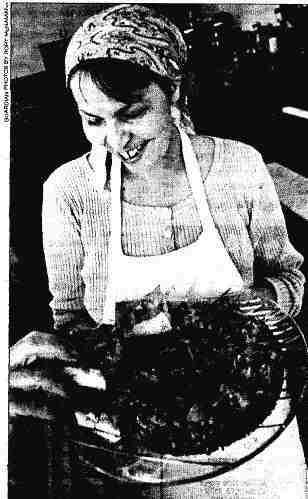A touch of Romany
By Paul Reidinger
T he word gypsy conjures powerfully romantic images of earringed, fortunetelling nomads trekking to and fro across the dusty trails of old Europe but it's seriously misleading. Gypsy derives from Egypt, which was the point of origin claimed by a wandering crew that tried to enter Paris in the summer of 1427. (They were sent instead to St. Denis.) But the gypsies or Roma, as they describe themselves in fact originated in northern India, and their language, the oddly named Romany, is Sanskritic, though noticeably freighted with Slavonic and Greek words from a long medieval sojourn in the Balkans. While the Roma have touched, and been touched by, many nations, the one most closely identified with them isn't Greece or India or France, but Hungary where they are known, rather grandly, as faraoni, in tribute to the pharaohs of ancient Egypt. And it's the food of Hungary a spicy festival of paprika,
garlic, and butter that the Roma have taken as their own, further modifying with spices from their own Asian past. (Paprika, interestingly, which is to Hungary what clotted cream is to England, is in fact a fairly recent arrival in that land, brought by the Ottoman Turks.) If Bistro E Europe, a foundling restaurant on a stretch of Mission Street in the Excelsior that looks not to have changed much in the last 50 years, were merely a Hungarian place, it would still be in fairly rarified company in this town. The only other Hungarian place I know of is the Hungarian Sausage Factory, in Bernal Heights. But E Europe may well be the only gypsy, or gypsyish, restaurant in the city, or the region. For that reason alone, it's worth a voyage that turns out to be practically nothing at all maybe 10 minutes by car from the inner Mission. Inside, the restaurant looks as if it might have been lifted whole from Budapest. It has the shabbychic, wrought iron chairs feel of those places in Pest's old Jewish Quarter
where, in communist times, dissidents met to discuss samizdat, smoke cigarettes, and eat goulash. One difference at E Europe is the Roma music playing on the sound system; it's energetic, danceable old-world house music. (Spanish flamenco dancing, incidentally, is gypsy in origin, and the gypsies were sometimes called flamencos -"Flemish" in 19th century Spain.) If all you got to eat was the basket of bread that arrives soon after you're seated, you would not go away disappointed. Chef and owner Julia Pecak bakes all the loaves on the premises, and that means a warmth and freshness not even the best boutique bakery can match. Of course there's the famous Hungarian fried bread, langos ($4.50, including a side of sour cream), which resembles nothing so much as a pizza crust made of pastry and, for us, made a nice match with a creamy vegetable pâté ($4.50). But there's also grilled Roma bread (aromatic with the hot oil smell of grilled cheese sandwiches), rye, and country white. As with the chips and salsa you usually get at the start of a Mexican meal, you have to be careful not to gorge yourself before the real food starts arriving. The ubiquitousness of paprika in Pecak's cooking cannot be overstated. There were flecks of the spice in the sour cream. There was a nice rusty glaze of it on the gypsy pork steak ($7.50 at brunch) and on the accompanying sautéed potatoes. Paprika loomed large in the flawless chicken paprikash ($12.50), a big plate of braised chicken pieces served on a bed of spatzle, with julienne of red and yellow peppers and an enveloping cream sauce. The only dish we found not to carry a charge of paprika was the pork schnitzel ($15.50), crusted in deep gold and tender as butter though the cutlet was accompanied by reddishbronze paprika potatoes and a heap of shredded red cabbage, pickled to a purplish opalescence and zipped up with a good jolt of cumin. And, of course, the desserts, which Pecak (naturally) makes herself and lifts from the baking pans while you watch fruit cobblers ($3), fruit-and-cheese pies ($3), or, most memorable, crepes smeared with rose hip jelly and showered with confectioners' sugar ($3.50). The mood in Bistro E Europe at such moments is one of deep, welcoming warmth. Pecak wants her restaurant to be a kind of home to the neighborhood and to destination diners alike. If we don't often associate the Roma with home, maybe it's because we continually underestimate their capacity for surprise.

Gypsy delight: Julia Pecak, owner and chef, displays
a plate of Roma gypsy fruitcake and cheese squares.
Bistro E Europe
4901 Mission (at France), S.F. (415) 469-5637.
Dinner: Tues.-Sun., 5:30-10 p.m.
Brunch: Sat-Sun., 11 a.m.-3 pm.
Cash only. Comfortable noise level. Wheelchair accessible.
The article appeared abt. 6/00 in a S.F. newspaper